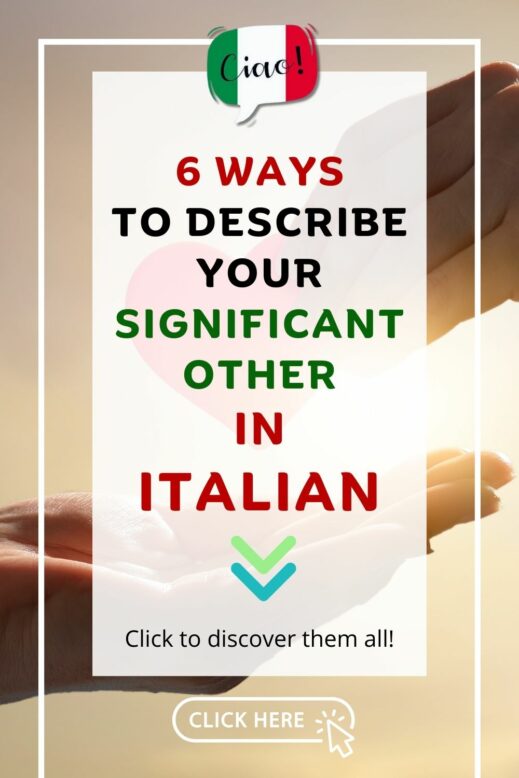Have you ever wondered about the various ways to address a significant other in Italian? Much like English, where we use diverse terms from the casual “boyfriend” and “girlfriend” to the more committed “husband” and “wife,” Italian boasts a rich array of expressions. In this article, we delve into the myriad terms you might encounter when discussing relationships in the Italian language. Let’s begin!

Ragazzo / Ragazza
Let’s start with the most casual way to refer to a significant other. Ragazzo and ragazza are akin to the English terms boyfriend and girlfriend. These are commonly used when you’re not living with the other person and during the younger stages of a relationship when the commitment might not be absolute.
Vado al cinema con la mia ragazza stasera.
I’m going to the cinema with my girlfriend tonight.
If an older woman were to refer to her partner as ragazzo, it would be presumed she is talking about her son. Similarly, if an older man uses ragazza, it might come across as inappropriate or creepy.
In addition to signifying romantic relationships, ragazzo and ragazza also mean boy/young man and girl/young woman, respectively. These terms are not appropriate for referring to children.
Quella ragazza sta tenendo la mano di quel ragazzo.
That girl is holding that boy’s hand.

Compagno / Compagna
The terms compagno and compagna serve as a safe and inclusive choice in various situations, avoiding assumptions about the marital status of the couple. They are typically used between couples who are not married but are living together or engaged in a long-term relationship.
In English, compagno/a has several translations beyond companion, including expressions like “other half,” “significant other,” and “partner.”
La mia compagna arriverà a breve. Va bene se l’aspettiamo?
My partner will be here soon. Is it ok if we wait for her?

Fidanzato / Fidanzata
Fidanzato and fidanzata traditionally refer to a fiancé and fiancée, respectively, indicating an engagement or imminent marriage.
This being said, an intriguing cultural shift is taking place among older individuals, who frequently choose to use the terms fidanzato and fidanzata for their significant other, even when marriage isn’t on the horizon. Having experienced divorce and with no intentions of relocating or remarrying, they prefer to adopt the concept of an “eternal engagement” that may not necessarily lead to marriage or cohabitation. (source)
Voglio presentarti la mia fidanzata, Giulia.
I’d like to introduce my fiancée, Giulia.

Marito / Moglie
The terms marito (husband) and moglie (wife) in Italian are used to refer to a married couple.
It’s noteworthy that when using the terms marito or moglie, which fall into the category of close family members, one should refrain from including the definite article. Therefore, it’s more accurate to say mio marito or mia moglie instead of il mio marito or la mia moglie.
When someone is aware that a couple lives together but remains uncertain about their marital status, it’s common for them to use terms like marito or moglie with a hint of uncertainty. Typically, in such situations, the couple themselves will clarify by saying, “We’re married” or, in Italian, “Siamo sposati.“
Dov’è tuo marito? – Non lo so. Forse è uscito.
Where is your husband? – I don’t know. Maybe he’s gone out.
Interestingly, some women who have been in long-term relationships still opt for marito to describe their significant other. This is especially true of women who are eagerly anticipating a proposal!
Specifically within the context of a wedding ceremony, marito e moglie translates to man and wife.
Vi dichiaro marito e moglie.
I pronounce you man and wife.

Moroso / Morosa
The terms moroso and morosa, derived from amoroso (lover), are commonly used in many Northern Italian regions like Veneto, Friuli, Emilia-Romagna, and Piemonte. The most fitting English translation for these terms is “sweetheart.” These terms serve as substitutes for ragazzo/a, compagno/a, and fidanzato/a but they won’t be understood across all of Italy.
Ce l’hai il moroso?
Have you got a boyfriend?
There are other regional variations that mean the same thing as moroso/a including:
- toso/a (Lombardy and Veneto)
- frego/a (Perugia)
- duddo/a (Sicily
- damo/a (Lucca)
- zatu/a (Calabria)

Partner
The incorporation of English terms into Italian is a growing trend, so it’s no surprise that partner has found its way into the Italian vocabulary. Borrowed from English, partner is mainly used within the professional and sportive sphere, not in everyday speech.
Mario ha cambiato di nuovo partner!
Mario’s changed girlfriends again!

Heather Broster is a graduate with honours in linguistics from the University of Western Ontario. She is an aspiring polyglot, proficient in English and Italian, as well as Japanese, Welsh, and French to varying degrees of fluency. Originally from Toronto, Heather has resided in various countries, notably Italy for a period of six years. Her primary focus lies in the fields of language acquisition, education, and bilingual instruction.


